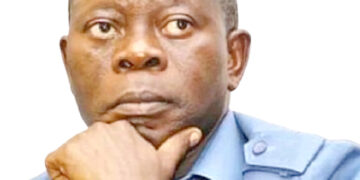Corruption is unethical, illegal, and harmful to society. It erodes trust, undermines the rule of law, perpetuates inequality and injustice, undermines confidence in institutions, damages communities, and destroys economies. These concepts are sacrosanct almost everywhere in the world except when it is happening in Nigeria. Here, you might just be rewarded with a political appointment, a chieftaincy title or a religious position because there is a thin line between corruption and integrity.
Corruption, defined as the misuse of power for personal gain, plagues societies around the world. In Colin Nye’s classical definition, corruption is “behaviour that deviates from the formal duties of a public role (elective or appointive) because of private regarding (personal, close family, private clique) wealth or status gains”. Mushtaq Khan also defines corruption as “behaviour that deviates from the formal rules of conduct governing the actions of someone in a position of public authority because of private-regarding motives such as wealth, power, or status”.
Corruption can manifest in various forms, including bribery, embezzlement, nepotism, and fraud. These activities undermine the trust that is fundamental to social, economic, and political systems. Corruption can exist at all levels, from low-level bureaucratic corruption to large-scale corporate and political scandals. It is an equal-opportunity employer, and the following hacks should be noted.
Nigerian Corruption Hacks
When it comes to corruption in Nigeria, always know that the first rule of the game is bigger is better. Think big, dream bigger and never start small. Small rogues in Nigeria end up getting lynched by angry mobs or if lucky arrested and imprisoned with some of their accusers wishing they had stolen something better to enrich themselves.
Secondly, whatever you do, please don’t chop alone, share it wide and far. Do giveaway ensuring that the very people whose wealth you have stolen for yourself, family and generations unborn, are the immediate beneficiaries of your corruption fuelled philanthropy. That way, there will be allies in government and the general masses to stand up for you. As long as they get some ‘small, small’ handout from you, karma is not going to catch up with you, at least not immediately. All their curses and anger will be softened by your palliatives. Amen! To be successfully corrupt, you must have allies everywhere from the ordinary masses in the slums to the judiciary, law enforcement agencies and Aso Rock!
Let’s not forget the joker, which is to always make sure you play the ethnic card. Wear the regalia of your ethnic group and make sure to let everyone know you are a son or daughter of the soil. It doesn’t matter if you perpetually steal the transformer to supply electricity to your community or embezzle the funds meant for critical infrastructure. This is important if you are caught with your hand in the cookie jar, your ethnic group can always fight to the death for you, declare your accusation a witch-hunt and say, “Leave him alone, is he your thief?”
Also, remember to give massively to religious and traditional institutions. These ones will ensure you get the best seats in places of worship, pray for your success and long life as well as ensure you get traditional titles like Odogwu, Bashorun and Galadima. With their backing, your corruptly amassed wealth will last a lifetime and the poor, angry mob will dare not curse those whom ‘God’s’ prophets have blessed, abi? In fact, if you are ever arrested and convicted, they will pray for you and declare a thanksgiving when you are released.
Lastly, if you can’t be in the judiciary or law enforcement, then run for or rig yourself into office, preferably as a legislator, executive governor or even president. You need the immunity and connections that these offices provide to ensure that you are never prosecuted and convicted. There are four P’s necessary for corruption to take place, these are preference, power, privilege and payment – all four are within the reach of Nigeria’s political elite.
There you have it. Thank me later! Pun intended.
All Bark, No Bite
Nigeria has two main anti-corruption agencies among 16 other agencies enforcing regulations. The Economic and Financial Crimes Commission (EFCC) and the Independent Corrupt Practices and Other Related Offences Commission (ICPC). The ICPC was established by an Act in 2000 to prohibit and prescribe punishment for corrupt practices and other related offences, vesting the ICPC with the responsibilities of investigation and prosecution of offenders thereof.
The EFCC was established by another Act four years later in 2004 with the mandate to combat financial and economic crimes. The Commission is empowered to prevent, investigate, prosecute and penalise economic and financial crimes and is charged with the responsibility of enforcing the provisions of other laws and regulations relating to economic and financial crimes. Both agencies are currently vested with the tasks of investigation, education, and sanctioning.
This duplicity complicates and undermines the fight against corruption in Nigeria. To succeed, three conditions must be met – political will, freedom from interference and genuine powers. However, after almost 4 decades of collective existence, the ICPC and EFCC have had little success in fighting the cancer and culture of corruption.
Firstly, there must be political will with genuine buy-in from the political leadership. Senior (2006) argues ‘the principal people who can change a culture of corruption if they wish to do so are politicians… they make the laws and allocate the funds that enable laws to be enforced’. Secondly, there must be freedom from political interference. Thirdly, ACAs need genuine power to investigate and prosecute cases. Critics have however noted that both agencies have more ‘bark than bite’ with no power other than that which has been given to it by the government of the day. These conditions remain a critical point of any successful anti-corruption fight.
Until then, corruption thrives.
Combating Corruption in Nigeria
Corruption comes at a significant moral and social cost with deeply rooted and negative consequences that undermine the rule of law, perpetuate poverty, and hinder development. It often disproportionately affects the most vulnerable members of society, who suffer the consequences of reduced public services, increased poverty, and social instability. Moreover, the success of corrupt individuals can lead to a culture of impunity, where unethical behaviour becomes normalised.
One of the most effective ways to combat corruption is by strengthening institutions. This involves ensuring that law enforcement, the judiciary, and anti-corruption bodies are independent, well-funded, and free from political influence. Implementing transparency in public procurement and budgeting, enforcement of strict financial regulations and the promotion of open government initiatives can reduce opportunities for corruption.
Educating citizens about the harmful effects of corruption and their rights can empower them to demand accountability. CSOs play a vital role in this by conducting awareness campaigns and providing platforms for whistleblowing. Encouraging and protecting whistleblowers who expose corruption can deter corrupt practices through strong legal frameworks that ensure the safety and anonymity of whistleblowers.
Ensuring that the judicial system is efficient, transparent, and impartial is critical in fighting corruption.
This includes the prosecution of high-profile cases without fear or favour. Corruption often involves cross-border activities, such as money laundering. International cooperation is crucial for tracking and recovering stolen assets and bringing perpetrators to justice.
The fight against corruption in Nigeria requires collective effort and commitment to building a just and transparent society because the alternative is detrimental to all involved per the words of Chinua Achebe, ‘Nigeria has become…irretrievably corrupt and unwilling to succeed as a society or country’.





